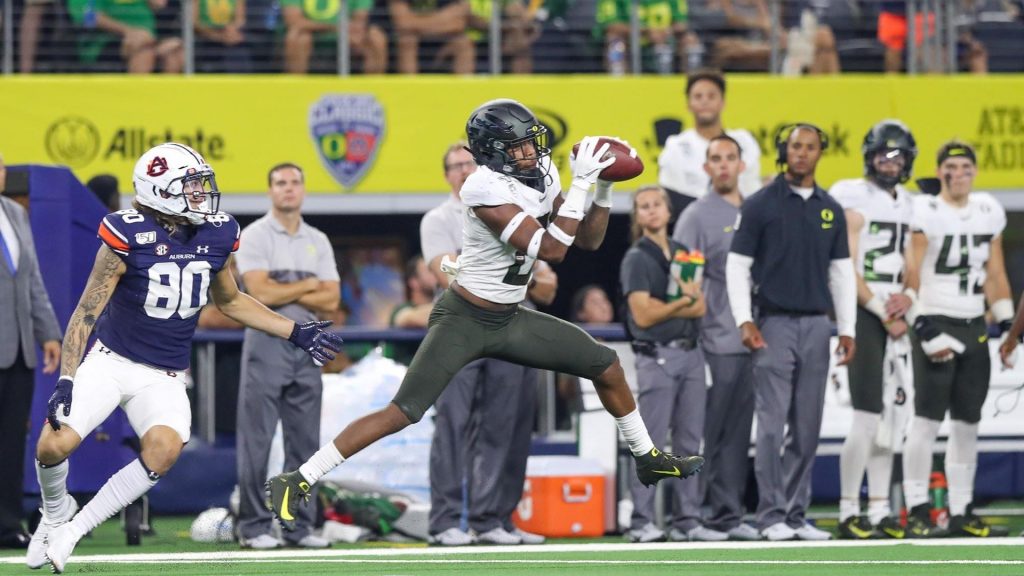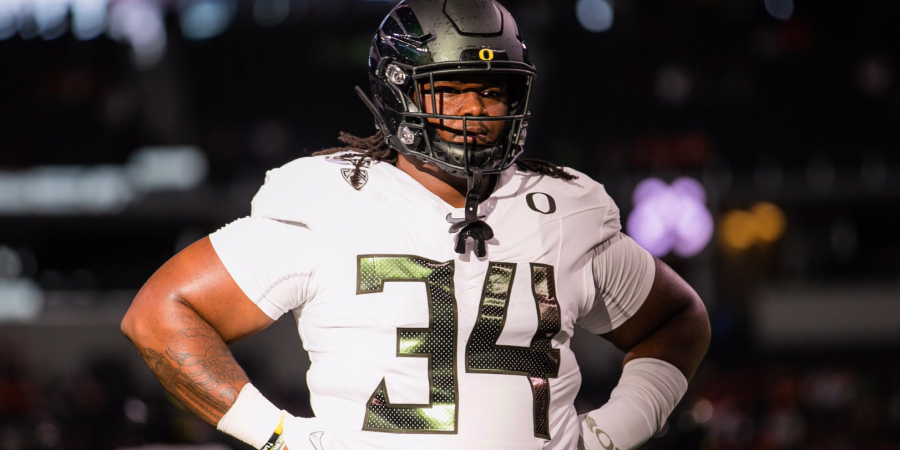There are tough losses, and then there are losses that absolutely gnaw at every fiber of your being.
On Saturday night in Arlington, Texas, the 11th-ranked Oregon Ducks experienced the latter in stunning and agonizing fashion, falling to 16th-ranked Auburn, 27-21.
For 59 minutes and 51 seconds of game action, the Ducks never trailed. That was before Auburn quarterback Bo Nix – in his first game as a true freshman – connected on a 26-yard touchdown pass to wide receiver Seth Williams to give the Tigers the lead with nine seconds left in the contest. That touchdown would cap a comeback that was fueled by 21 unanswered points for Auburn in the second half.
Despite the crushing loss, there were a number of bright spots for the Ducks in this game, but in the end, it will be vividly remembered by Duck fans for the missed opportunities and a 21-6 lead with 4:21 left in the third quarter that was ultimately squandered.
With game one officially in the books, WFOD digests the major takeaways stemming from this stinging defeat.
1. Missed opportunities undo Oregon
The number of parallels you can draw between this game and Oregon’s loss to Auburn in the 2011 BCS Championship Game, and Oregon’s loss to Stanford a year ago are downright eerie. Against the Tigers in 2011, the Ducks’ loss was marred by failed red zone opportunities that could have changed the complexion of that game (the shoelace tackle on Lavasier Tuinei, followed by the Ducks coming up empty on four downs deep in Auburn territory particularly stands out). It was also a game that featured a game-winning Auburn drive that was highlighted by a dagger to the heart just before the end of regulation (see Michael Dyer).
On Saturday, the Ducks would find themselves in the red zone on five separate occasions, converting three of those trips into touchdowns. However, it was the two chances where the Ducks came away scoreless that will keep Oregon coaches, players, and fans tossing and turning for awhile. The first opportunity came late in the first quarter when a Justin Herbert pass was dropped by redshirt freshman Bryan Addison in the back of the end zone which would have given the Ducks a 14-0 lead. Instead, the Ducks settled for a field goal attempt on 4th down, a 20-yarder which was missed by true freshman kicker Camden Lewis. Auburn would use the ensuing drive to kick a field goal that cut Oregon’s lead to 7-3.
Then came the gut-wrenching fumble deep in Auburn territory; a play that no doubt brought back flashbacks to Oregon’s loss last season vs. Stanford. Set up by an outstanding 81-yard punt return by Oregon’s Jevon Holland, the Ducks started their drive on the Auburn nine-yard line. However, on the very next play, a fumbled exchange between Justin Herbert and running back CJ Verdell would be picked up and returned by Auburn 83 yards to the Oregon three-yard line. The Tigers would convert a field goal four plays later to trim Oregon’s lead to 14-6.
The Stanford fumble would spark a comeback for the Cardinal. And while the Auburn fumble didn’t provide the same kind of radical momentum swing, it was effective in stopping momentum for the Ducks, who were primed to take a commanding 21-3 midway through the second quarter.
Add it all up, and the net result of these wasted chances is another excruciating loss for Oregon.
2. Oregon offense bogged down, while the defense got gassed
Oregon’s play in second half against Auburn on Saturday was also somewhat reminiscent of their uneven play from half-to-half last season. In fairness to Ducks head coach Mario Cristobal and offensive coordinator Marcus Arroyo, Oregon was playing somewhat handcuffed before the game even kicked off, as the Ducks were down six scholarship pass catchers facing off against a rugged Auburn defense. Still, the Ducks found remarkable success in the first half despite some of the missed opportunities, as Johnny Johnson, Jaylon Redd, and Spencer Webb performed admirably throughout the day. That all changed in the second half, as the Ducks could only scrape together 133 yards of total offense, which included just 13 yards on the ground. For the most part, Oregon’s offensive line did a decent job of protecting Herbert and opening holes for Verdell, but the offense’s inability to consistently create momentum for themselves late in the game proved to be an issue caused more so by lack of playmakers than it did play calling – at least from this vantage point.
Defensively, the Ducks shined for most of the game. Oregon first year defensive coordinator Andy Avalos was effective in forcing Nix into mistakes and halting the Auburn offense when they marched deep into Duck territory, but it wouldn’t last. As the Tigers slowly, but surely, crept their way back into the game, the Oregon defense became noticeably more fatigued. Auburn leaned on a running game that seemingly got stronger as the game wore on, which resulted in touchdowns on three of their final five possessions. In the end, Oregon’s second half failures on offense coupled with the defense’s inability to get stops and get rest proved to be deadly.
3. Ducks demonstrate an inability to hold onto a sizable lead
This is now the second year in a row in which the Ducks have suffered a cruel and unusual loss to an opponent who they had more or less buried late in the game. As alluded to earlier, last year’s loss to Stanford and Saturday’s loss to Auburn can be rationalized by missed opportunities. However, the repeat nature of these crushing losses is beginning to feel somewhat systemic. Perhaps the losses, in the end, are as easy to explain as bad luck, but it’s hard to dismiss the sense that this team lacks confidence and a cool demeanor when playing with a lead.
Unlike successful Oregon teams of the past, this team, early in Cristobal’s tenure as head coach, seems to get tight and allow their mistakes to compound. There was never a strong sense that, even with a 13-point lead late in the third quarter, this group had the game under control. There was an unsettled nature about their play and execution that only seemed to negatively snowball once Auburn began to find some success. Indeed, there’s no doubting that this Oregon team is talented and plenty capable of being successful – they certainly proved as much on Saturday. Yet, when the chips have been down, they’ve also shown that, at the very least, they’re still learning how to finish.
4. Kudos to Johnny Johnson and Jaylon Redd
It was no secret that heading into Saturday’s game vs. Auburn, the Ducks would be leaning heavily on the veteran experience of Johnny Johnson and Jaylon Redd at wide receiver. Then again, without the services of Juwan Johnson (calf), Brenden Schooler (foot), Mycah Pittman (shoulder), JR Waters (foot), Lance Wilhoite (hamstring), and Cam McCormick (ankle), what other choice did they have? Even with that, however, both Redd and Johnson proved they were capable enough of spearheading the Ducks’ aerial attack against one of the toughest defenses Oregon will face all season. Last year, both players were easy targets for fan ire, as inconsistent play all too often defined their contributions. But on Saturday, Johnson (seven receptions, 98 yards) and Redd (nine receptions, 64 yards) emerged as reliable targets for Herbert in a hamstrung offense. Unfortunately, it may be a few more weeks before the Ducks return to full strength at the position, but Saturday’s performances from Johnson and Redd inspire hope that the offense can manage as their wounded pass catchers heal.

5. Enjoy Jevon Holland while you can
Few players on either sideline during Saturday’s game were as impactful as Oregon sophomore safety Jevon Holland. Though the stat sheet will say that Holland only made four tackles in a losing effort, he did it all for the Ducks both on defense and special teams. His interception late in the first half helped preserve Oregon’s 14-6 lead going into halftime, while his 131 yards on three punt returns provided the Ducks with the starting opportunities the offense needed to put points on the board. If Saturday’s all-around performance from Holland is any indication of what’s to come for him individually this season, then Duck fans will have to accept the notion that the Bay Area native may only be around for one more season before making the jump to the NFL.

